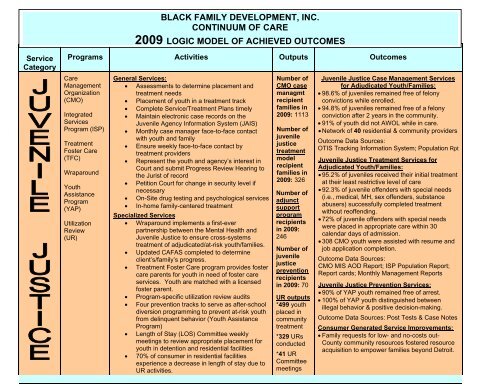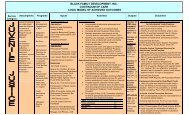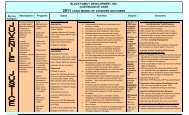2009 logic model of achieved outcomes - Black Family Development
2009 logic model of achieved outcomes - Black Family Development
2009 logic model of achieved outcomes - Black Family Development
Create successful ePaper yourself
Turn your PDF publications into a flip-book with our unique Google optimized e-Paper software.
BLACK FAMILY DEVELOPMENT, INC.<br />
CONTINUUM OF CARE<br />
<strong>2009</strong> LOGIC MODEL OF ACHIEVED OUTCOMES<br />
Service<br />
Category<br />
Programs Activities Outputs Outcomes<br />
Care<br />
Management<br />
Organization<br />
(CMO)<br />
Integrated<br />
Services<br />
Program (ISP)<br />
Treatment<br />
Foster Care<br />
(TFC)<br />
Wraparound<br />
Youth<br />
Assistance<br />
Program<br />
(YAP)<br />
Utilization<br />
Review<br />
(UR)<br />
General Services:<br />
• Assessments to determine placement and<br />
treatment needs<br />
• Placement <strong>of</strong> youth in a treatment track<br />
• Complete Service/Treatment Plans timely<br />
• Maintain electronic case records on the<br />
Juvenile Agency Information System (JAIS)<br />
• Monthly case manager face-to-face contact<br />
with youth and family<br />
• Ensure weekly face-to-face contact by<br />
treatment providers<br />
• Represent the youth and agency’s interest in<br />
Court and submit Progress Review Hearing to<br />
the Jurist <strong>of</strong> record<br />
• Petition Court for change in security level if<br />
necessary<br />
• On-Site drug testing and psycho<strong>logic</strong>al services<br />
• In-home family-centered treatment<br />
Specialized Services<br />
• Wraparound implements a first-ever<br />
partnership between the Mental Health and<br />
Juvenile Justice to ensure cross-systems<br />
treatment <strong>of</strong> adjudicated/at-risk youth/families.<br />
• Updated CAFAS completed to determine<br />
client’s/family’s progress.<br />
• Treatment Foster Care program provides foster<br />
care parents for youth in need <strong>of</strong> foster care<br />
services. Youth are matched with a licensed<br />
foster parent.<br />
• Program-specific utilization review audits<br />
• Four prevention tracks to serve as after-school<br />
diversion programming to prevent at-risk youth<br />
from delinquent behavior (Youth Assistance<br />
Program)<br />
• Length <strong>of</strong> Stay (LOS) Committee weekly<br />
meetings to review appropriate placement for<br />
youth in detention and residential facilities<br />
• 70% <strong>of</strong> consumer in residential facilities<br />
experience a decrease in length <strong>of</strong> stay due to<br />
UR activities.<br />
Number <strong>of</strong><br />
CMO case<br />
managmt<br />
recipient<br />
families in<br />
<strong>2009</strong>: 1113<br />
Number <strong>of</strong><br />
juvenile<br />
justice<br />
treatment<br />
<strong>model</strong><br />
recipient<br />
families in<br />
<strong>2009</strong>: 326<br />
Number <strong>of</strong><br />
adjunct<br />
support<br />
program<br />
recipients<br />
in <strong>2009</strong>:<br />
246<br />
Number <strong>of</strong><br />
juvenile<br />
justice<br />
prevention<br />
recipients<br />
in <strong>2009</strong>: 70<br />
UR outputs<br />
*499 youth<br />
placed in<br />
community<br />
treatment<br />
*329 URs<br />
conducted<br />
*41 UR<br />
Committee<br />
meetings<br />
Juvenile Justice Case Management Services<br />
for Adjudicated Youth/Families:<br />
• 98.6% <strong>of</strong> juveniles remained free <strong>of</strong> felony<br />
convictions while enrolled.<br />
• 94.8% <strong>of</strong> juveniles remained free <strong>of</strong> a felony<br />
conviction after 2 years in the community.<br />
• 91% <strong>of</strong> youth did not AWOL while in care.<br />
• Network <strong>of</strong> 40 residential & community providers<br />
Outcome Data Sources:<br />
OTIS Tracking Information System; Population Rpt<br />
Juvenile Justice Treatment Services for<br />
Adjudicated Youth/Families:<br />
• 95.2% <strong>of</strong> juveniles received their initial treatment<br />
at their least restrictive level <strong>of</strong> care<br />
• 92.3% <strong>of</strong> juvenile <strong>of</strong>fenders with special needs<br />
(i.e., medical, MH, sex <strong>of</strong>fenders, substance<br />
abusers) successfully completed treatment<br />
without re<strong>of</strong>fending.<br />
• 72% <strong>of</strong> juvenile <strong>of</strong>fenders with special needs<br />
were placed in appropriate care within 30<br />
calendar days <strong>of</strong> admission.<br />
• 308 CMO youth were assisted with resume and<br />
job application completion.<br />
Outcome Data Sources:<br />
CMO MIS AOD Report; ISP Population Report;<br />
Report cards; Monthly Management Reports<br />
Juvenile Justice Prevention Services:<br />
• 90% <strong>of</strong> YAP youth remained free <strong>of</strong> arrest.<br />
• 100% <strong>of</strong> YAP youth distinguished between<br />
illegal behavior & positive decision-making.<br />
Outcome Data Sources: Post Tests & Case Notes<br />
Consumer Generated Service Improvements:<br />
• <strong>Family</strong> requests for low- and no-costs out-<br />
County community resources fostered resource<br />
acquisition to empower families beyond Detroit.
Service<br />
Category<br />
Programs Activities Outputs Outcomes<br />
Multi-Systemic<br />
Therapy<br />
(MST)<br />
Intensive<br />
<strong>Family</strong><br />
Services<br />
(IFS)<br />
General Services:<br />
• Assessments, Screenings, Diagnoses<br />
• Case Management<br />
• Home- and community-based interventions<br />
• Strength-based, Person-centered approach<br />
• Child/family safety education and techniques<br />
• Crisis Intervention & 24/7/365 availability<br />
• Educational support, advocacy, and goal setting<br />
• Monthly client satisfaction surveys<br />
• Staff growth and development trainings<br />
Specialized Services:<br />
• Individual & family treatment to adjudicated youth 2<br />
times weekly<br />
• Cognitive-behavioral therapy<br />
• Risk / Strengths and Needs / Psychosocial<br />
Assessments; Treatment Plans; Release Plans;<br />
Safety Plans; and Progress Notes<br />
• Random drug screens<br />
• Cognitive-Behavioral Skill-building strategies<br />
• Substance Abuse Prevention Education<br />
• Employment, and independent living, skills<br />
• Anger management<br />
• Mentoring<br />
• Transportation<br />
• Sexual health/abstinence education, as appropriate<br />
• Participation in BFDI Positive Youth <strong>Development</strong><br />
Initiatives<br />
Number <strong>of</strong><br />
mental<br />
health<br />
treatment<br />
recipient<br />
families in<br />
<strong>2009</strong>: 312<br />
Mental Health Treatment Services for<br />
Adjudicated Youth/Families:<br />
• 94% <strong>of</strong> discharged youth have not been arrested<br />
for re-<strong>of</strong>fense<br />
• 89% <strong>of</strong> youth served are living at home, thus not<br />
requiring out-<strong>of</strong>-home placement<br />
• 80% <strong>of</strong> the youth served were attending<br />
school/vocational training or work<br />
Outcome Data Sources:<br />
2600 Data Report; Monthly Management Reports;<br />
Discharge Summaries; AWOL Reports; Therapist<br />
Adherence Measure Data; Program Roster<br />
Consumer Generated Service Improvements:<br />
• IFS consumers’ requests for transportation<br />
assistance, fostered these program changes:<br />
- Therapists provide youth up to a week’s supply<br />
<strong>of</strong> bus tickets after other means are exhausted.<br />
- Therapists will aid youth/parent with purchasing<br />
a discount monthly bus pass.<br />
- Therapists will work with youth/parent on<br />
budgeting transportation costs, and follow-up<br />
re: budget sufficiency.<br />
2
Service<br />
Category Programs Activities Outputs Outcomes<br />
F.A.C.E. :<br />
(Finding<br />
Abstinence with<br />
Commitment to<br />
Empowerment)<br />
-Intensive<br />
Outpatient<br />
(IOP)<br />
-Outpatient<br />
(OP)<br />
-Womens’<br />
Specific (WS)<br />
-Womens’<br />
Specific Mini-<br />
Grant<br />
-Case Mgmt.<br />
(CM)<br />
City <strong>of</strong> Detroit:<br />
- HOPE (OP)<br />
- F.R.E.E.<br />
(Finding<br />
Resolution<br />
Everyday through<br />
Education)<br />
CMO Hope<br />
(OP & IOP<br />
treatment)<br />
General Services:<br />
• Individual, group, marriage, co-dependency, family,<br />
and Gender-Specific counseling<br />
• Didactic group education<br />
• Support services to clients in the following areas:<br />
financial, medical, optical, dental, employment,<br />
housing, vocational, educational, psycho<strong>logic</strong>al, child<br />
care, clothing, food, and mental health services<br />
• Education about alcohol, tobacco, and other drugs<br />
(ATOD) and its negative effects on individuals,<br />
families, and communities<br />
• Assessments, service plans, community referrals,<br />
resource linking, monitoring, follow-up, advocacy,<br />
and aftercare linkages<br />
• Transportation assistance (bus tickets/staff vehicles)<br />
Specialized Services:<br />
• IOP –group/didactic/individual/family or genderspecific<br />
therapy provided 3 days/week for 3 hours/day<br />
• Outpatient –group/didactic/individual/family or genderspecific<br />
therapy 1-2 days/week for 1-1.5 hours/day<br />
• Relapse Prevention<br />
• Contingency Management<br />
• Urine Screens<br />
• Referrals to AA/NA support groups<br />
• Weekly Life Skills Group and bi-weekly cultural<br />
outings for the clients (CM)<br />
• Youth life skill education to improve peer interactions,<br />
pursuit <strong>of</strong> life goals, and coping mechanisms free from<br />
use <strong>of</strong> ATOD (FREE)<br />
• Parenting education to reduce risk <strong>of</strong> ATOD use (FREE)<br />
• Advancing development/ enforcement <strong>of</strong> ATOD<br />
ordinances, regulations, and legislation (FREE)<br />
• Provision <strong>of</strong> competent services to co-occurring<br />
disorder (mental health and substance abuse)<br />
affected consumers and their families<br />
3<br />
Number <strong>of</strong><br />
substance<br />
abuse<br />
treatment<br />
recipient<br />
families in<br />
<strong>2009</strong>: 184<br />
Number <strong>of</strong><br />
substance<br />
abuse case<br />
managmt<br />
services<br />
received<br />
by families<br />
in <strong>2009</strong>:<br />
- Basic<br />
needs<br />
referrals<br />
provided:<br />
320<br />
-Bus tickets<br />
provided:<br />
512<br />
-Drug<br />
screen<br />
referrals:<br />
73<br />
Number <strong>of</strong><br />
substance<br />
abuse<br />
prevention<br />
recipients<br />
in <strong>2009</strong>:<br />
FREE: 14,368<br />
Substance Abuse Treatment Services:<br />
• 100% (65 <strong>of</strong> 65) persons served in the FACE<br />
program remained arrest- free during treatment.<br />
• 99% (83 <strong>of</strong> 84) persons served in the HOPE<br />
program remained arrest- free during treatment.<br />
• 89% (31 <strong>of</strong> 35) <strong>of</strong> CMO-HOPE clients did not<br />
acquire further legal <strong>of</strong>fenses during treatment.<br />
• 88% (74 <strong>of</strong> 84) persons who completed the<br />
HOPE program demonstrated urine tests that<br />
were free <strong>of</strong> drugs/alcohol.<br />
• 83% (29 <strong>of</strong> 35) persons served in the CMO-<br />
HOPE program were in school and/or employed.<br />
Outcome Data Sources:<br />
City <strong>of</strong> Detroit (BSATPR) Outcome Data; SEMCA<br />
enrollment data, Progress Notes; Discharge<br />
Summary; Aftercare Agreement; Self-Report;<br />
ACCESS Laboratory Drug Screen Results; JIS<br />
Substance Abuse Case Management Services:<br />
• 51 follow-up surveys were completed by <strong>2009</strong><br />
FACE participants indicating an improved quality<br />
<strong>of</strong> life at 30 days post discharge.<br />
Outcome Data Sources:<br />
Quality <strong>of</strong> Life Questionnaire responses<br />
Substance Abuse Prevention Services:<br />
• 100% <strong>of</strong> the youth who participated in Lions<br />
Quest: Skills for Adolescence education groups,<br />
and parents who completed a Parenting Wisely<br />
group, demonstrated an increase in knowledge<br />
and skill development.<br />
Outcome Data Source:<br />
Educational curriculums’ pretest and posttests<br />
Consumer Generated Service Improvements:<br />
• FACE case management consumers’ requested<br />
job search assistance. Detailed service planning<br />
included employment, and other life skills.<br />
• Treatment consumers indicate they need greater<br />
motivational incentives to maintain consistent<br />
treatment gains. Staff will implement no-cost<br />
rewards (i.e. certificates, group leadership).
Service<br />
Category Programs Activities Outputs Outcomes<br />
Number <strong>of</strong><br />
Families First <strong>of</strong><br />
Michigan (FFM)<br />
family<br />
presrvation<br />
treatment<br />
<strong>Family</strong><br />
Connections (FC)<br />
- Children’s<br />
Bureau<br />
- CMO<br />
- UWSEM<br />
recipient<br />
families in<br />
<strong>2009</strong>:<br />
FFM: 204<br />
FC: 25<br />
Your Essential<br />
Services (Y.E.S.)<br />
- Essential Svcs<br />
- Homeless<br />
Prevention Svcs<br />
(HP)<br />
Intake<br />
General Services:<br />
• Initial contact with family is made within 24 hours<br />
• Small caseloads allowing for intensive intervention<br />
• Services are home-based and community-based<br />
• Time-limited programming<br />
• An eco<strong>logic</strong>al approach using family & community<br />
interactions<br />
• Specific assistance for families’ basic needs<br />
• Individual, <strong>Family</strong>, and Group Counseling<br />
• Support groups<br />
• Case Management<br />
Specialized Services:<br />
• Parenting education<br />
• Teach/<strong>model</strong>: home management, budgeting,<br />
communication and assertiveness skills<br />
• Domestic violence services, including assistance with<br />
personal protection orders (PPOs)<br />
• Advocacy with schools, medical and mental<br />
health facilities<br />
• Housing and relocation assistance<br />
• Assistance with food, clothing, appliances and other<br />
concrete needs.<br />
• Linkages to natural helping networks and ongoing<br />
community supports<br />
• Transportation support services<br />
• Initial face to face contact with family in 24 hours<br />
• Safety planning<br />
• Families set a minimum <strong>of</strong> 2 solution focused goals<br />
with referring CPS worker and FFM counselor<br />
• Individual and <strong>Family</strong> Activities<br />
• FC Multi-family Activities<br />
• Assistance with identifying stable, adequate housing<br />
• Financial assistance for security deposit, rent and,<br />
utility payments<br />
• Assistance with securing legal documents such as<br />
state identification, birth certificates, criminal record<br />
clearance or other legal documents necessary to<br />
secure housing<br />
• A single point <strong>of</strong> entry with assessment, resource<br />
linking /coordination, and follow-up services provided<br />
4<br />
Number <strong>of</strong><br />
family<br />
presrvation<br />
prevention<br />
recipients<br />
in <strong>2009</strong>: 50<br />
Number <strong>of</strong><br />
family<br />
presrvation<br />
case<br />
managmt<br />
recipient<br />
families in<br />
<strong>2009</strong>:<br />
212<br />
Number <strong>of</strong><br />
persons<br />
served by<br />
Intake Dept<br />
in <strong>2009</strong>:<br />
6405<br />
<strong>Family</strong> Preservation Treatment Services:<br />
• 95% <strong>of</strong> families remained intact during FFM<br />
participation.<br />
• 85% <strong>of</strong> families have reported avoiding<br />
placement three (3) months after FFM discharge<br />
Outcome Data Sources:<br />
Tracking log <strong>of</strong> all referrals received & terminated;<br />
3-month follow-ups documented in FFIS<br />
<strong>Family</strong> Preservation Prevention Services:<br />
• Increased Child Safety: 85% <strong>of</strong> referred youth<br />
remained safely at home.<br />
• Increased Child Well Being<br />
• 80% <strong>of</strong> families marked a steady and consistent<br />
positive improvement in child well-being.<br />
Outcome Data Sources:<br />
Substantiated abuse reports from the Department<br />
<strong>of</strong> Human Services, CBCL and Self Reports<br />
<strong>Family</strong> Preservation Case Mgt. Services:<br />
• Of the 212 families facing homelessness or at<br />
risk for homeless, 104 received Emergency<br />
concrete assistance with basic needs.<br />
Outcome Data Sources: Program Roster<br />
Intake Services:<br />
• 648 crisis intervention contacts were processed.<br />
• 183 Face-To-Face contacts occurred; a 30%<br />
increase from 2008.<br />
• 287 consumers requested holiday assistance<br />
• 187 consumers requested food assistance;<br />
285% decrease from 2008, due to more<br />
Detroiters qualifying for food stamps, and the<br />
increase in the food stamp benefits. <strong>2009</strong> saw<br />
an increase in agency’s providing food supplies.<br />
Outcome Data Sources: Intake Database& Binder<br />
Consumer Generated Service Improvements:<br />
• CEO’s DTE collaboration brought to light<br />
consumers’ not benefitting from Earned<br />
Income/Home Heating Credit. Intake now<br />
screens and educates consumers to benefit from<br />
both tax credits and THAW.
Service<br />
Category Programs Activities Outputs Outcomes<br />
African<br />
Centered<br />
Olympics<br />
<strong>Family</strong> Health<br />
Fair<br />
My Healthy<br />
Body<br />
BFDI Youth<br />
Employment<br />
Program<br />
Back To School<br />
Community Day<br />
Keys To<br />
Literacy<br />
Skillman “Good<br />
Neighborhood<br />
Initiative”-<br />
Networking for<br />
Change<br />
Trained To<br />
Reign-<br />
Financial<br />
Literacy<br />
General Services:<br />
• Showcase the gifts and talents <strong>of</strong> youth<br />
• Strengthen and preserve families by empowering our<br />
youth and our neighborhoods<br />
• Osborne community revitalization and collectivism<br />
• Mathematic, literacy, and academic training<br />
Specialized Services:<br />
• Remembering and understanding African American<br />
Heritage and honoring our ancestors<br />
• Introducing the Nguzo Saba<br />
• Small group and community-wide nutrition and<br />
fitness based education, which included teaching on<br />
how to read and understand food labels, the body’s<br />
dependence upon water and daily water intake, how<br />
to decrease daily fat consumption, defining energydense<br />
foods, appropriate restaurant eating, and<br />
health screenings.<br />
• Work experience, career training, and pr<strong>of</strong>essional<br />
mentoring for underserved Detroit youth.<br />
• A Community Day program for children, youth, and<br />
families in resource-poor communities that <strong>of</strong>ten lack<br />
the basic supplies to be ready for school.<br />
• A reading methodology to improve youths’ reading<br />
comprehension using diagnostic testing, pre-and<br />
post-testing at each internet-based, interactive,<br />
reading level.<br />
• Targeted collaboration with Osborn community<br />
residents, block club presidents to foster organized<br />
communication and policing efforts through Block<br />
Club development.<br />
• Reconvene de-activated block clubs.<br />
• Establish new block clubs within the Osborn<br />
community.<br />
• Financial literacy education to equip youth for<br />
adulthood and wise financial decision-making<br />
beginning in adolescence.<br />
5<br />
Number <strong>of</strong><br />
African<br />
Centered<br />
Olympics<br />
participants:<br />
347<br />
Number <strong>of</strong><br />
<strong>Family</strong><br />
Health Fair<br />
participants:<br />
385<br />
Number <strong>of</strong><br />
Healthy Body<br />
participants:<br />
32<br />
Number <strong>of</strong><br />
employment<br />
participants:<br />
10<br />
Back To<br />
School<br />
participants:<br />
500<br />
Number <strong>of</strong><br />
Keys To<br />
Literacy<br />
participants:<br />
26<br />
Number <strong>of</strong><br />
block clubs<br />
established:<br />
295<br />
Number <strong>of</strong><br />
Financial<br />
Literacy<br />
participants:<br />
15<br />
• 347 students increased their knowledge <strong>of</strong><br />
African American history through competitive<br />
classroom, school, and City-wide competitions.<br />
• 385 persons educated on nutritious eating,<br />
physical activity, and preventive health care<br />
screenings (dental, diabetes, blood pressure, etc)<br />
• 84% <strong>of</strong> students completed the My Healthy Body<br />
Olympics final project demonstrating their<br />
increased knowledge <strong>of</strong> nutrition and fitness.<br />
• 27 youth and their families’ benefitted from<br />
nutrition education homework.<br />
• 300 resource-challenged youth 6-18 received<br />
school supplies.<br />
• 41 adults participated in the training entitled,<br />
“Make the Streets Safe for Kids and How To<br />
Start A Block Club” at the Back to School Rally.<br />
• 90% <strong>of</strong> youth who attempted the Fundamental<br />
ASLES reading level completed.<br />
• 67% <strong>of</strong> youth who attempted the Advanced<br />
ASLES reading level completed.<br />
• 310 residents signed a Commitment Statement<br />
to establish a block club.<br />
• 117 residents were trained in grant writing to<br />
support their block club.<br />
• An additional 70 residents trained on block club<br />
leadership strategies (1,142 residents total).<br />
• 31 Osborn community block club meetings held.<br />
• Osborn residents elected a BFDI staff member<br />
to the Osborn Governance Board.<br />
• 15 youth received training on assets, liabilities,<br />
budgets, investing, and net worth.<br />
Outcome Data Sources:<br />
Sign-in Sheets; Progress Notes; Meeting Agendas<br />
and Minutes; Program Reports/Logic Models<br />
Consumer Generated Service Improvements:<br />
African Olympics team coach requested to receive<br />
Study Manual earlier. BFDI staff completed and<br />
distributed the Study Manual earlier.




